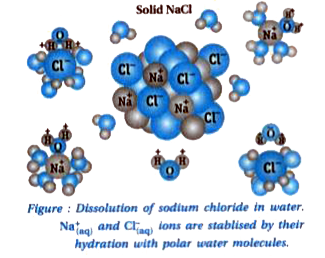Explain hydration of sodium chloride.
Sodium chloride (common salt) is an important component of our diet and is formed by reaction between hydrochloric acid and sodium hydroxide.
It exists in solid state as a cluster of positively charged sodium ions and negatively charged chloride ions which are held together due to electrostatic interactions between oppositely charged species.

The electrostatic forces between two charges are inversely proportional to dielectric constant of the medium.
Water, a universal solvent, possesses a very high dielectric constant of 80. Thus, when sodium chloride is dissolved in water, the electrostatic interactions are reduced by a factor of 80 and this facilitates the ions to move freely in the solution. Also, they are well-separated due to hydration with water molecules.
Topper's Solved these Questions
- EQUILIBRIUMBOOK - KUMAR PRAKASHANCHAPTER - EQUILIBRIUMEXERCISE - SECTION-A Try Your self -2
6 Videos
- EQUILIBRIUMBOOK - KUMAR PRAKASHANCHAPTER - EQUILIBRIUMEXERCISE - SECTION-A Try Your self -3
10 Videos
- ENVIRONMENT CHEMISTRY BOOK - KUMAR PRAKASHANCHAPTER - ENVIRONMENT CHEMISTRY EXERCISE - Question For Module (Section-C)
1 Videos
- HYDROCARBONSBOOK - KUMAR PRAKASHANCHAPTER - HYDROCARBONSEXERCISE - (Questions for Module (Section - D))
1 Videos
Similar Questions
Explain the formation of sodium chloride.
View SolutionExplain why solid sodium chloride does not allow the electricity to pass through.
View SolutionExplain the following of sodium chloride.
View SolutionThe aqueous solution of sugart does not conduct electricity. However when sodium chloride is added to water, it conducts electricity. How will you explain this statement on the basis of ionisation and how is it affected by concentration of sodium chloride ?
View SolutionThe aqueous solution of sugart does not conduct electricity. However when sodium chloride is added to water, it conducts electricity. How will you explain this statement on the basis of ionisation and how is it affected by concentration of sodium chloride ?
View SolutionExplain giving reasons why :
Solution of sodium chloride has no effect on litmus, but a solution of zinc chloride turns blue litmus red.∗∗
View SolutionExplain why hydrated magnesium chloride can not be dehydrated upon heating.
View SolutionExplain why hydrated magnesium chloride can not be dehydrated upon heating.
View SolutionSuggest a method of separation for a mixture of sodium chloride and ammonium chloride. Explain the process.
View SolutionTaking the example of sodium chloride , explain how do metals combine with nonmetals.
View Solution
